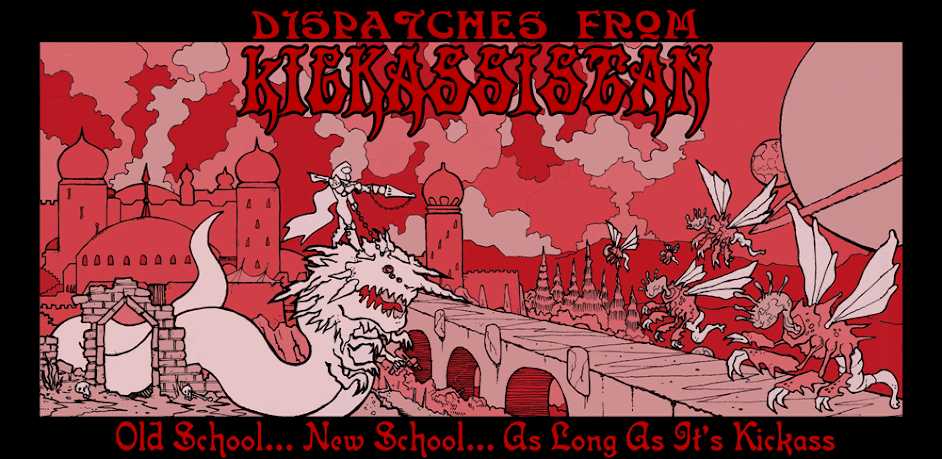For my Quasquetherion/Hyperbarbaria game, I gave myself the problem of introducing my "new to old school" gamers to the aforementioned old school games. This first introduction carries with it an introduction to the lethality of such games, something that is really lacking from more modern games. Rather than just throw the kids to the proverbial wolves, I opted in to using the ACKS Mortal Wounds table and rules when PCs hit (or supercede) 0 hp. For the uninitiated, how that system works is that, once your character has been treated by another character, you roll a d20 and add some situational modifiers, and the result tells you how close to death you are according to the Mortal Wounds table. Then you roll a d6 to determine exactly what shape your injury takes, etc.
We've been using that system to pretty good effect for quite some time, but it's come to me to feel like it's awkward for use with Delving Deeper and... these kids are really racking up injuries. Many players are on their 2nd character by now (Tim is on #3), but many others have players missing eyes, legs and other appendages. Our thief, notably, is missing her knees (maybe not missing, just "missing them working correctly"). I'm not sure that what I want is a "kinder, gentler system," but more of a "faster, easier system." For an idea of how to move forward, I stole an idea, yet again, from +Claytonian JP.
In his Wizardarium of Calabraxis, Clay has this really cool idea for handling random encounters. Instead of ye olde "1 or 2 on a d6 means random encounter," Clay's idea is "roll 2d6, matches mean an encounter." He gets a little more in-depth than that, but it was enough to inspire my idea for how to do this whole Death & Dismemberment thing that folks have been tussling with for ages. So, thanks, man. I appreciate the leg up here.
Also huge props go out the +Donn Stroud for helping me sort out some of the details here and providing me with feedback on this. Sometimes I just can't get an idea straight until I've tried to convey it to someone else.
Please note that a new PC will have no dice in his death dice pool. Thus, the first time he gets "dropped," he is not going to die. He still rolls his death dice, however, if only to determine how many hp he gets back at the end of the fight.
We've been using that system to pretty good effect for quite some time, but it's come to me to feel like it's awkward for use with Delving Deeper and... these kids are really racking up injuries. Many players are on their 2nd character by now (Tim is on #3), but many others have players missing eyes, legs and other appendages. Our thief, notably, is missing her knees (maybe not missing, just "missing them working correctly"). I'm not sure that what I want is a "kinder, gentler system," but more of a "faster, easier system." For an idea of how to move forward, I stole an idea, yet again, from +Claytonian JP.
In his Wizardarium of Calabraxis, Clay has this really cool idea for handling random encounters. Instead of ye olde "1 or 2 on a d6 means random encounter," Clay's idea is "roll 2d6, matches mean an encounter." He gets a little more in-depth than that, but it was enough to inspire my idea for how to do this whole Death & Dismemberment thing that folks have been tussling with for ages. So, thanks, man. I appreciate the leg up here.
Also huge props go out the +Donn Stroud for helping me sort out some of the details here and providing me with feedback on this. Sometimes I just can't get an idea straight until I've tried to convey it to someone else.
Death Dice!
Every time a PC hits or drops below 0 hp, he's out for the rest of the comat unless someone heals him (which is handled normally for the system). After combat, the PC adds one die to his "death dice pool" and then rolls that pool of dice. For each die that shows the same result, note the number and compare it to the ability scores on the character sheet. For example, most D&D rule sets have Strength as the first ability score; if you rolled 2 1's, you'd be looking at Strength. For every die that showed that number, roll 1d6 as damage against that ability score. If the result takes the ability score to or below 0, the character dies. If not, the character lives, but has taken that amount of ability score damage. For every 5 points of damage to any one ability score, the PC also suffers a permanent injury (which may be healed through magic or super doctor stuff later on). If the character has not died as a result of the death dice roll, he regains consciousness with a number of hit points equal to the lowest die in the death dice pool that is not a multiple.
 Everybody Gets One
Everybody Gets One
Please note that a new PC will have no dice in his death dice pool. Thus, the first time he gets "dropped," he is not going to die. He still rolls his death dice, however, if only to determine how many hp he gets back at the end of the fight.Ability Score Damage
Not all versions of D&D and derivatives use ability score damage. Some DMs hate it, some (like me) love it. If you hate it, then this system is not for you and you should probably think about using a different death and dismemberment system. Awhile ago, I started handling ability score damage in the same manner in all the D&D-style games I run. Here's the poop: Upon taking ability score damage, all ability modifiers and their derivatives related to that score must be recalculated. Ability score damage is healed at a rate of 1 point per day of normal activity, 1 point per ability score per day for full rest (no strenuous activity; thus, if you've taken both Strength and Dexterity damage, and your PC acts normally during a day, he may regain one point of Strength or Dexterity, whereas if he takes it easy, he can regain one point of both scores).Multiple Multiples
Once you get to a 4d6 death dice pool, it becomes possible to roll different numbers multiple times. On 4d6, for example, you could roll "2, 2, 5, 5," or 2 2's and 2 5's. This would result in 2d6 points of damage against ability score #2 and 2d6 points of damage against ability score #5. This possibility, along with the possibility of adding on multiples of the same number with higher death dice pools is why tempting fate is a bad idea to be avoided. Once or twice, sure... but too many times and the death dice pool adds up quickly.Permanent Injuries
For every five points of ability score damage taken by a PC from any one roll of the death dice pool, the PC will incur one permanent injury. A permanent injury permanently reduces the ability score by 1 (remember that ability score damage will heal) until it is removed, probably through magical means. In addition, each injury has a mechanical effect above and beyond this permanent damage. The ability score damaged determines what sort of injury has been sustained:- Strength
- Severed Arm! - The PC loses the use of one arm and cannot do anything that takes two arms, obviously. The character's ability to lift dead weight is halved (doesn't affect carrying capacity, just lifting).
- Severed Leg! - The PC loses a leg. Maybe it was cleaved off or maybe he lost it to gangreene, but it's gone. Movement rate and carrying capacity are halved.
- Constitution
- Internal Injury - Something's not healing right and it causes the PC a lot of pain. Until healed, the PC can't run.
- Something's Loose - The PC develops a chronic, hacking cough which is often inappropriate and uncontrollable. The PC takes a -2 penalty to all saving throws vs. poison and disease that is air borne.
- Dexterity
- Muscle or Joint Damage - The PC's joints or joint muscles are stiff and probably painful; he is at a -2 penalty to all dice rolls associated with mobility until healed.
- Severed Hand! - The PC loses one of his hands. You can't perform any two-handed tasks.
- Intelligence
- Closed Head Injury - The character is often unable to recall knowledge or relevant skills. The PC is at a -2 penalty to all dice rolls associated with memory and learned abilities.
- Language Center Damage - The PC loses either the ability to speak or to read and write until this damage is healed. This is really bad for wizards.
- Wisdom
- Sensory Damage - One of the PC's senses is harmed. The PC is at a -2 penalty to all dice rolls associated with that sense until healed.
- Impulse Control - The character becomes impulsive and rash; he may need to make saving throws to avoid bad ideas, which he'll make at a -2 penalty.
- Charisma
- Bad Scarring - The character's scarring is so severe that people are often frightened by his visage. He is at -2 to all reaction rolls, even to intimidate. ("Seriously, Bill, don't talk to it! Kill it!" NPCs can be so insensitive...)
- Speech Impairment - Maybe his larynx is crushed, maybe he bit off part of his tongue, but the PC is having a hard time speaking. -2 penalty to all dice rolls involving verbal communication.

